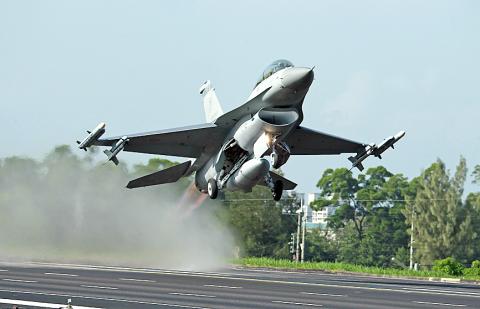The administration of US President Donald Trump has given tacit approval to Taiwan’s request to buy more than 60 F-16 Fighting Falcons, people familiar with the matter said.
Trump’s advisers encouraged Taiwan to submit a formal request for the jets, built by Lockheed Martin, which it did this month, said the people, who asked not be identified discussing internal discussions.
Any such request would need to be converted into a formal proposal by the US departments of defense and state, and then US Congress would have 30 days to decide whether to block the sale.

Photo: AP
The administration of then-US president Barack Obama in 2011 rejected a similar Taiwanese request over concern about antagonizing China.
However, Trump has chosen a more aggressive approach at a time when his administration is locked in difficult negotiations with China over trade.
It is unclear whether a potential F-16 sale could become a bargaining chip in those discussions or is solely an outgrowth of the administration’s renewed focus on Taiwan, a long-time US ally that was once seen as a bulwark against Chinese expansion in the Asia-Pacific region.
The White House declined to comment on Taiwan’s request, which several of the people said also includes tanks.
In October last year, US Vice President Mike Pence assailed China for moves to chip away at Taiwan’s diplomatic presence overseas and its ramping up of pressure on private companies to refer to Taiwan as a province of China.
In announcing its request for the airplanes, Taiwan did not say how many jets it was seeking.
The request followed a lengthy back and forth with the administration after the US swatted down Taiwan’s earlier request for Lockheed’s more modern F-35 Lighting II.
The US Department of State’s Bureau of Political-Military Affairs, which oversees such weapons sales, declined to comment on the possibility of the weapons sales.
Even if a sale is approved by Congress and a contract is reached with Lockheed, the airplanes probably would not be going to Taiwan anytime soon.
Lockheed spokeswoman Carolyn Nelson said that the first F-16s to be built at a new facility in Greenville, South Carolina, would not roll off the production line until 2021, and those are committed to Bahrain.
The jets were previously built in Fort Worth, Texas.
US National Security Adviser John Bolton is a long-time supporter of Taiwan, and some advisers on the US National Security Council have urged a more aggressive posture, including sending more US warships through the Taiwan Strait.
As president-elect, Trump shattered precedent and infuriated China by taking a call from President Tsai-Ing-wen (蔡英文) and calling into question the US’ continuing commitment to the “one China” policy that underpinned the establishment of ties between Beijing and Washington under then-US president Richard Nixon.
Trump has since affirmed US support for “one China,” while also making clear that protecting Taiwan is a priority in his dealings with leaders in Beijing.

The CIA has a message for Chinese government officials worried about their place in Chinese President Xi Jinping’s (習近平) government: Come work with us. The agency released two Mandarin-language videos on social media on Thursday inviting disgruntled officials to contact the CIA. The recruitment videos posted on YouTube and X racked up more than 5 million views combined in their first day. The outreach comes as CIA Director John Ratcliffe has vowed to boost the agency’s use of intelligence from human sources and its focus on China, which has recently targeted US officials with its own espionage operations. The videos are “aimed at

STEADFAST FRIEND: The bills encourage increased Taiwan-US engagement and address China’s distortion of UN Resolution 2758 to isolate Taiwan internationally The Presidential Office yesterday thanked the US House of Representatives for unanimously passing two Taiwan-related bills highlighting its solid support for Taiwan’s democracy and global participation, and for deepening bilateral relations. One of the bills, the Taiwan Assurance Implementation Act, requires the US Department of State to periodically review its guidelines for engagement with Taiwan, and report to the US Congress on the guidelines and plans to lift self-imposed limitations on US-Taiwan engagement. The other bill is the Taiwan International Solidarity Act, which clarifies that UN Resolution 2758 does not address the issue of the representation of Taiwan or its people in

US Indo-Pacific Commander Admiral Samuel Paparo on Friday expressed concern over the rate at which China is diversifying its military exercises, the Financial Times (FT) reported on Saturday. “The rates of change on the depth and breadth of their exercises is the one non-linear effect that I’ve seen in the last year that wakes me up at night or keeps me up at night,” Paparo was quoted by FT as saying while attending the annual Sedona Forum at the McCain Institute in Arizona. Paparo also expressed concern over the speed with which China was expanding its military. While the US

SHIFT: Taiwan’s better-than-expected first-quarter GDP and signs of weakness in the US have driven global capital back to emerging markets, the central bank head said The central bank yesterday blamed market speculation for the steep rise in the local currency, and urged exporters and financial institutions to stay calm and stop panic sell-offs to avoid hurting their own profitability. The nation’s top monetary policymaker said that it would step in, if necessary, to maintain order and stability in the foreign exchange market. The remarks came as the NT dollar yesterday closed up NT$0.919 to NT$30.145 against the US dollar in Taipei trading, after rising as high as NT$29.59 in intraday trading. The local currency has surged 5.85 percent against the greenback over the past two sessions, central